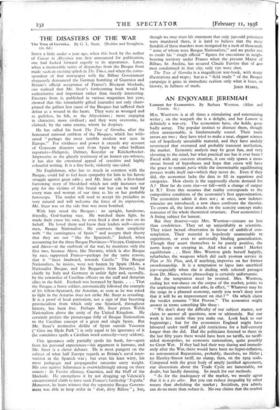THE DISASTERS OF THE WAR
SINCE a little under a year ago, when this book by the author of Caisar in Abyssinia was first announced for publication, one had looked forward eagerly to its appearance. Later, when a memorable series of dispatches from the Basque front made such an exciting splash in The Times, and when the corre- spondent of that newspaper with the Bilbao Government eloquently denounced the German bombing of Guernica and Britain's official acceptance of Franco's Biscayan blockade, one realised that Mr. Steer's forthcoming book would be authoritative and important rather than merely interesting. Excerpts from it, published in various magazines last year, showed that this remarkably gifted journalist not only cham- pioned the gallant lost cause of the Basques but suffered their defeat as a wound in the heart. They were as wronged and as guileless, he felt, as the Abyssinians ; more engaging in character, more civilised ; and they were overcome, he claimed, by the same enemy, whom he despises.
He has called his book The Tree of Gernika, after the honoured national emblem of the Basques, which has with- stood " perhaps the most terrible modern war seen in Europe." For vividness and power it exceeds any account of Goyescan disasters sent from Spain by other brilliant reporters—Delapree, Delmer, Koestler or Knickerbocker. Impressive as the ghastly testimony of an honest eye-witness, it has also the emotional appeal of sensitive and highly colourful writing. It is a fine book, violently one-sided.
No Englishman, who has so much in common with the Basque, could fail to feel keen sympathy for him in his heroic struggle against great odds ; and Mr. Steer tells a first-hand harrowing story of bloodshed which not only increases our pity for the victims of this brutal war but can be read by every man and woman of our time as his or her probable horoscope. The reader will tend to accept his prejudice as very natural and will welcome the force of its expression. Mr. Steer was on the side that was most bombed.
With him stood the Basques : an upright, handsome, friendly, God-fearing race. He watched them fight, he made their cause his own, he even fired a shot or two on its behalf. He loved them and knew their leaders well—sincere men, Basque Nationalists. He contrasts their simplicity with " the cunningness of Spain " and accepts their theory that they are not " like the Spaniards." Indeed, when accounting for the three Basque Provinces—Vizcaya, Guipuzcoa and Alava—at the outbreak of the war, he mentions only the first two, because Alava, like Navarre, which is also Basque by race, supported Franco—perhaps for the same reason, that it " faces landward, towards Castile." The Basque Nationalists, he insists, were not beaten by Spain (Mola, a Nationalist Basque, and his Requetes from Navarre), but chiefly by Italy and Germany in unfair fight and, secondly, by the cowardice of Castilian officers on the staff and Asturian allies in the field. Euzkadi was betrayed by Spain. . . . That the Basque, a brave soldier, automatically followed the example of his fellow-Spaniard, the Asturian, as soon as he was asked to fight in the Asturias does not strike Mr. Steer as revealing. It is a proof of local patriotism, not a sign of that besetting provincialism from which only one Spaniard, throughout history, has been free. Perhaps Mr. Steer prizes Welsh Nationalism above the unity of the United Kingdom. He certainly prefers the picturesque folly of Basque Nationalism to the Castilian concept of a great and single Spain. But Mr. Steer's instinctive dislike of Spain outside Vasconia (" Give me Hyde Park ") is only equal to his ignorance of it (he sometimes spells a Castilian word correctly—very seldom).
This ignorance only partially spoils his book, for—apart from his personal experiences—his argument is humane, and Mr. Steer is a clever debater. He is most pungent on the subject of what half Europe regards as Britain's naval inter- vention in the Spanish war ; but even his least witty, his most pedagogic and propagandist sarcasms carry weight. His case against Salamanca is overwhelmingly strong on three counts : its Fascist alliance, Guernica, and the bluff of the blockade. He strengthens it by not dragging up Valencia's circumstantial claim to have sunk Franco's battleship Espana.' Moreover, he bears witness that the separatist Basque Govern- ment was able to keep order in " dear, dirty Bilbao " ; but,
though we may trust his statement that only 39o-odd prisoners were murdered there, it is hard to believe that the most fiendish of these murders were instigated by a mob of thousands " none of whom were Basque Nationalists," and we prefer not to credit his " rough official " figures for executions in neigh- bouring territory under Franco when the present Mayor of Bilbao, Sr. Areilzu, has assured Claude Farrere that of 400 men condemned in that city, only 15o were shot.
The Tree of Gernika is a magnificent war-book, with many illustrations and maps; but as a " field study " of the Basque campaign it gains in immediate realism only what it loses, as


















































 Previous page
Previous page